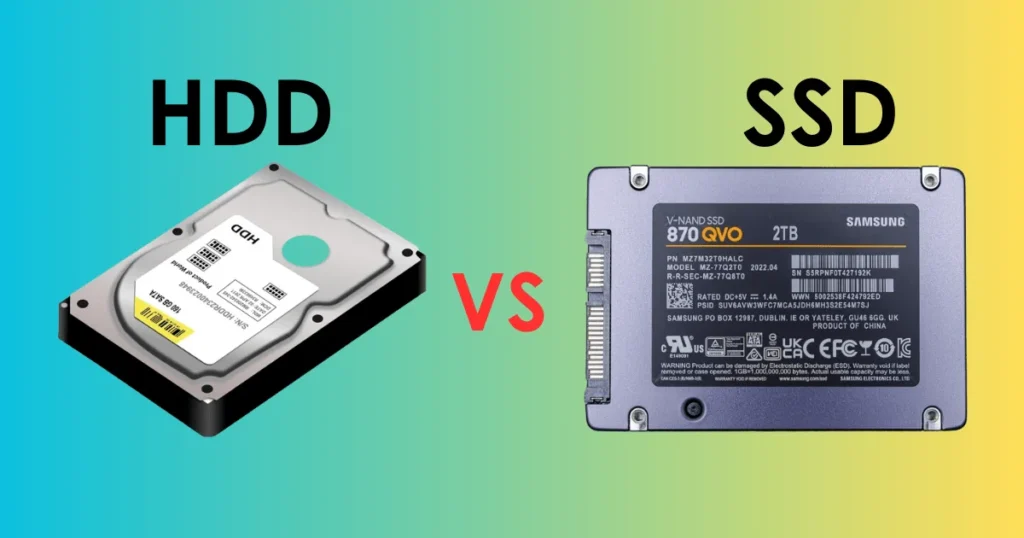What's HDD Different between SSD and HDD: Boost Storage

Introduction, what's HDD different between SSD and HDD
Since everything is stored on our devices in the digital age, including important documents and family photos, reliable storage is essential. The basis of our system is computing storage disks, which ensure that every piece of data is easily accessible and safely kept. The two primary storage drive types currently in use are solid-state drives and hard drives. Even though they have the same essential function, they differ greatly in terms of their functionality, execution efficiency, and impact on your computer’s overall performance.
Table of Contents
ToggleAssuming you are uncertain about which solid-state drive or hard drive is best for you, this blog will explain all you want to be familiar with them, including how they work, their benefits and drawbacks, and the kinds of clients each is the most appropriate for.
1. What is the hard drive?
One data storage technology that has been around for a while is the hard disk drive. To access data, a tiny read/write arm runs over a sequence of rotating disks called as platters. The Hard Disk Drive functions mechanically. These platters contain magnetic storage for the data on a hard disk drive, which enables the data to be read, written, and stored over time.
In the 1980s, when computers began to become mainstream, HDDs gained prominence. Because of their large storage capacity and stability, they gradually became the industry standard for data storage. For users who seek huge storage on a budget, HDDs are popular since they can store a lot of data at a reasonable cost.
2. What is the solid-state drive?
Quite possibly of the latest advancement away innovation is outlined by Solid State Drives, which have no moving parts like hard drives do. Rather, they utilize streak memory chips, which act in basically the same manner as memory cards or USB gadgets. Since strong state drives contain no mechanical parts, they are considerably quicker and more trustworthy than hard drives, especially when utilized frequently or moved around a ton.
At the point when SSDs initially hit the shopper market in the mid-2000s, their unique estimating was excessively over the top to empower mass use. In any case, as costs were brought down and innovation advanced, SSDs turned out to be all the more usually accessible. They are at this point typically utilized in reduced contraptions, laptops, and computers where strength, speed, and capability are critical.
Significant Distinctions Between HDDs and SSDs
1. Speed and Performance
The speed hole among SSDs and HDDs is one of the most critical. Since SSDs have no moving parts, they are a lot quicker and give moment admittance to information. Quicker boot times, quicker document moves, and upgraded execution all around are the aftereffects of this.
HDDs, then again, are slower because of their dependence on a turning plate. It takes time for the read/write arm to physically move to find data on the disk. For instance, opening a huge program on an HDD could take a few seconds, whereas an SSD could accomplish it very immediately. An SSD can have a significant impact on users who require fast performance, such as professionals utilizing demanding software or gamers.
2. Durability and Reliability
Especially for compact gadgets like workstations, SSDs are many times stronger than HDDs because they have no moving parts. There is a diminished probability of information misfortune on the off chance that a PC with an SSD is dropped unintentionally. On the other hand, HDDs are more defenseless to actual mischief given the inner plates and moving parts’ powerlessness to mileage.
Nonetheless, HDDs can be trustworthy when used in work area computers and other fixed gadgets where versatility isn’t an element. However, SSDs often beat HDDs in terms of overall longevity and dependability, particularly in high-impact and mobile applications.
3. Cost
HDDs provide a lot of capacity for the price and are more reasonably priced. Because of this, they are widely used in low-cost laptops and desktop computers as well as by consumers who require substantial storage for backups or large media files.
Despite their increasing affordability, SSDs still cost more per gigabyte than HDDs. Despite price reductions, SSDs are best suited for consumers who are more interested in speed and performance than maximal storage.
4. Power Consumption
SSDs additionally enjoy the benefit of utilizing less power than HDDs. Along these lines, SSDs are ideally suited for compact gadgets like workstations where battery duration is critical. HDDs may use up laptop batteries more quickly since they need more power to run their mechanical parts.
5. Capacity of Storage
At a lower cost, HDDs provide greater storage capacity. In most cases, HDDs are a superior option for consumers who require large volumes of storage without having to pay as much for them. An HDD is perfect for media collections, archives, and backup storage because its capacity can reach several terabytes (TB).
SSDs come in comparable storage capacities, but capacity dramatically raises the price. Most of clients pick SSDs of halfway sizes for speedier execution and consolidate them with bigger HDDs for additional capacity, even though huge limit SSDs are accessible however are ordinarily more costly.
4. Advantages and Disadvantages
Advantages of HDDs:
- Practical: HDDs are ideally suited for those on a strict financial plan since they are more affordable per gigabyte.
- Gigantic Capacity Decisions: Since they have huge limits, clients can reasonably store a ton of information.
- Availability: For decades, HDDs have been a mainstay of the industry and are widely accessible.
Disadvantages of HDDs:
- Slower Performance: Because of their mechanical design, they operate more slowly when it comes to data access and transmission.
- Greater Power Usage: They use more energy, which causes portable devices’ batteries to deplete more quickly.
- Less Durable: Particularly in portable gadgets, moving parts are more susceptible to physical harm.
SSD benefits include:
- Improved Effectiveness: SSDs give smooth performance of various tasks, quick application dispatches, and short boot times.
- Energy-cognizant: They utilize less energy, which expands the battery duration of versatile gadgets.
- Versatility: SSDs are more impervious to development and actual shock than HDDs.
SSD drawbacks include:
- Cost per gigabyte: SSDs continue to be increasingly expensive, especially for bigger capacities.
- Limited Write Cycle Lifespan: The flash memory cells in SSDs have a limited write cycle, even though modern SSDs are made to endure this for regular consumer use.
5. When Should I Pick an HDD or SSD?
Your budget and needs will determine whether you choose an SSD or HDD. A few examples are as follows:
- When to Pick an HDD: An HDD is an affordable option for applications like movie libraries or backups when you need a lot of storage but don’t need quick access. HDDs are adequate for desktop users who want large storage or for those who use their devices mostly for routine tasks like document management or browsing.
- When Should I Select an SSD? For jobs requiring speedier performance, like as editing, gaming, or other professional work, SSDs are the best option. Because they improve performance while preserving battery life, SSDs are frequently advantageous for laptops. An SSD is something that anyone looking for speed and dependability over raw storage capacity should think about.
6. Hybrid Options: SSHD (Solid State Hybrid Drive)
A third decision is the Solid-State Hybrid Drive (SSHD), which consolidates the upsides of HDDs and SSDs. A little portion of SSD storage is integrated inside an HDD, which is what an SSHD is. By storing often accessible files on the SSD portion and less frequently used data on the larger HDD portion, this configuration enables faster boot times and data access than a typical HDD.
Users who wish to balance speed and storage without having to pay for a full SSD could consider SSHDs. Nevertheless, they are still not as fast as a dedicated SSD, thus those who require the best performance might rather have a complete SSD.
Conclusion,
In conclusion, what’s HDD different between SSD and HDD choosing between SSD and HDD depends on your financial constraints, performance requirements, and storage requirements. SSDs are perfect for mobile devices and high-performance requirements because of their exceptional speed, energy economy, and durability. For consumers who require a lot of space without breaking the bank, HDDs offer affordable storage for big amounts of data.
You may maximize your device’s performance by selecting the best storage option based on your own needs. No matter what your needs are in gaming, altering, working, or simply requiring capacity for your records, there is an answer that suits you. In the realm of information stockpiling, both SSDs and HDDs presently have a spot, however, as innovation develops, SSDs are getting less expensive and may ultimately supplant HDDs in most of utilizations.
FAQs
Since SSDs and older computers sometimes share the same SATA port, the answer is yes. Newer NVMe SSDs, however, could need specialized hardware support.
Although TRIM and other techniques to optimize SSD speed or clone data are useful, no specific software is needed.
In response, HDDs are more affordable for large-capacity external storage requirements, but SSDs are superior for speed and portability.
Disparities in speed, endurance, and technology such as DRAM caching or NAND type (e.g., SLC, MLC, TLC) are the causes of price discrepancies.
Yes, HDDs are preferable for bulk storage since they get less expensive as their capacities increase (e.g., 4TB+).


